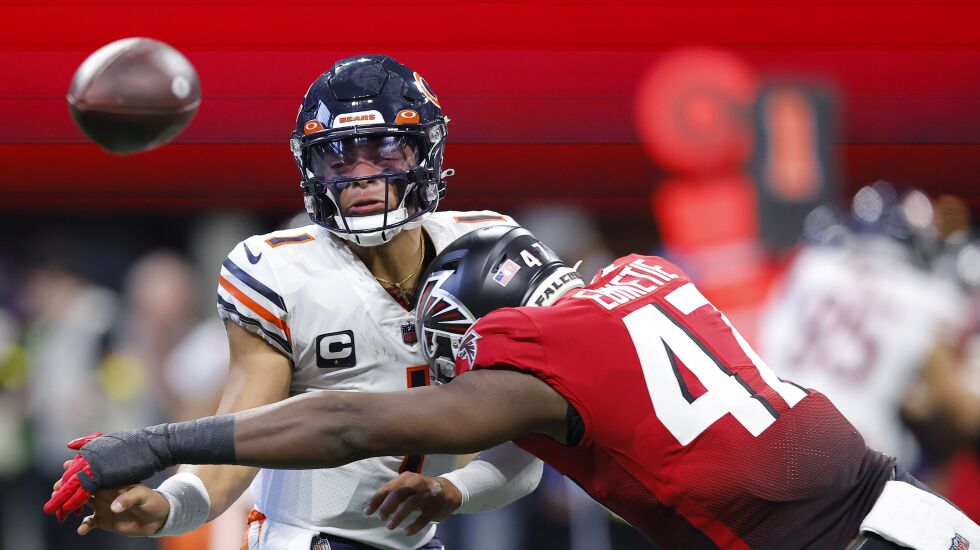
Justin Fields tried a spin move — and got speared in the back.
Almost two years ago, Fields scrambled on third-and-13 in Ohio State’s national championship semifinal game against Clemson. Tigers linebacker James Skalski hit him helmet-first in the back and was ejected. Fields missed one play.
The quarterback went to the medical tent, where he was injected with a painkiller, and finished one of the great performances in college football that season. Despite injuries to his ribs and hip, he threw for 385 yards and six touchdown passes to propel the Buckeyes to the national championship game.
Playing through pain — and with the aid of a numbing shot — was worth it then. Would it be Sunday?
Whether Fields faces the Jets with a separated left shoulder Sunday will be less of a matter of whether he can — and more of whether he should. It’s an important question that will tell us more about the way general manager Ryan Poles and head coach Matt Eberflus view the team’s rebuilding season than any move this side of the Roquan Smith trade.
Fields was limited in practice all week and is questionable to play. Friday, head coach Matt Eberflus said his status would be a game-time call.
Making the decision, though, will involve Poles, coaches, Fields and the team’s medical staff. Eberflus described a three-pronged approach to making his decision: the medical staff has to clear him for game action, Fields needs to feel good and the coaching staff has to believe he can perform well.
The circumstances argue that Fields should not play.
The Bears-Jets matchup is not the national championship semifinal. It has no playoff implications for the 3-8 Bears have as much a chance of making the NFL playoffs as Ohio State does. If anything, the Bears would stand to benefit from continued losing — were the season to end today, they’d draft third overall, their highest draft pick since they finished with the third-worst record in 2016.
Were the Bears’ record flipped, would Eberflus have a different decision to make?
“That’s a good question,” he said. “I don’t think so with this one. I don’t think it is. I think it’s the same decision.”
The Bears face the Packers next week — a game that matters more to those at the highest levels of the organization than any other game. The following week is the bye. Both dates are far more important for Fields than Sunday.
Then there are the Jets, whose defensive linemen are “unbelievable,” offensive coordinator Luke Getsy said.
“You put four D-linemen in and then they kind of rotate four other ones that come in that are just as good,” he said. “This front seven is the real deal. It’s why they’re having so much success this year.”
Only two teams knock down the quarterback more frequently than the Jets, who do so at a 12.4 percent clip. They rank fourth in pressure percentage, which measures hurries, knockdowns and sacks per dropback.
“If he plays, we will hit him,” Jets coach Robert Saleh said this week about Fields. “If he doesn’t play, we will do our best to hit the next guy.”
The Bears need to determine whether being cautious with their best asset is more important than continuing their offensive explosion. They’ve averaged 29.6 points the last five weeks after averaging 15.5 in Weeks 1-6.
If Fields plays, it would be with the help of a numbing injection administered Sunday morning. Participating with a separated shoulder would not expose Fields to greater long-term injury — provided that he has the strength in the numbed shoulder to be able to protect himself.
To Fields’ credit, he wants to play.
The better question, though, is whether the Bears should let him.







